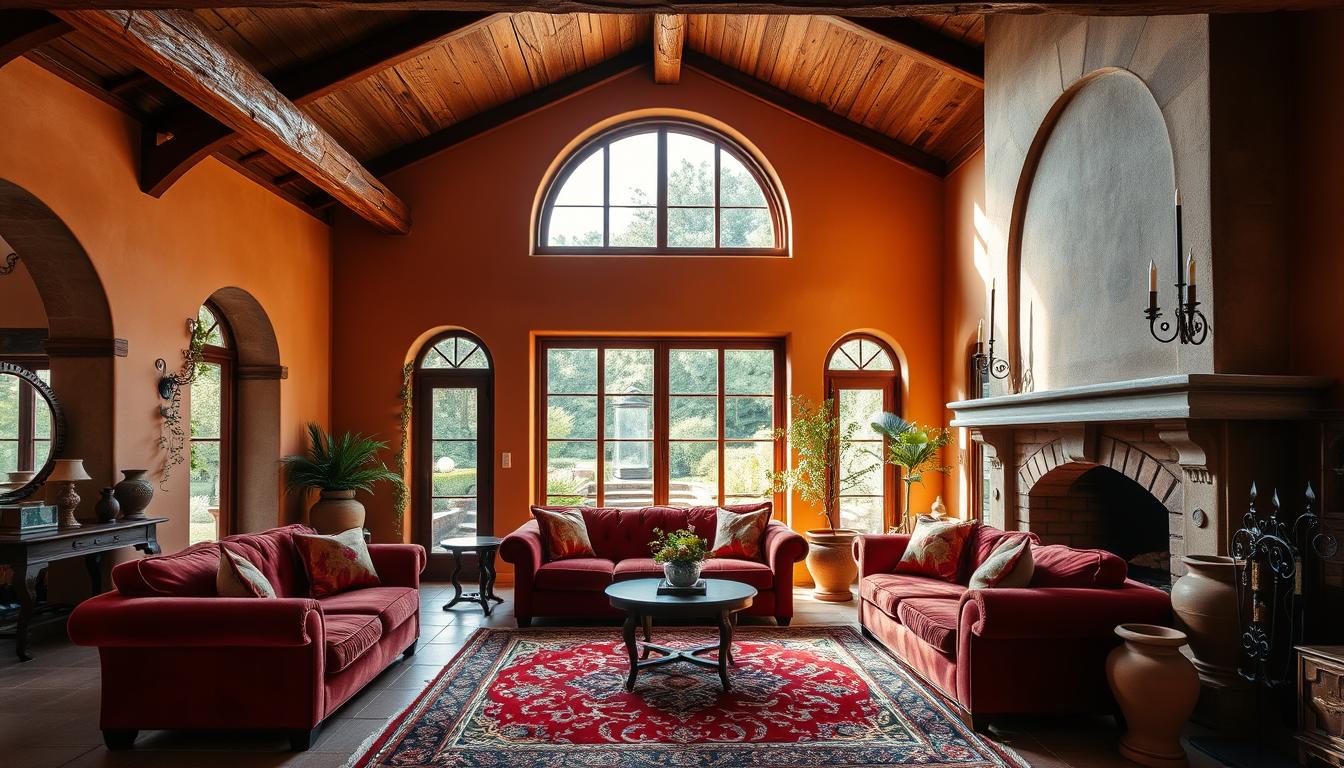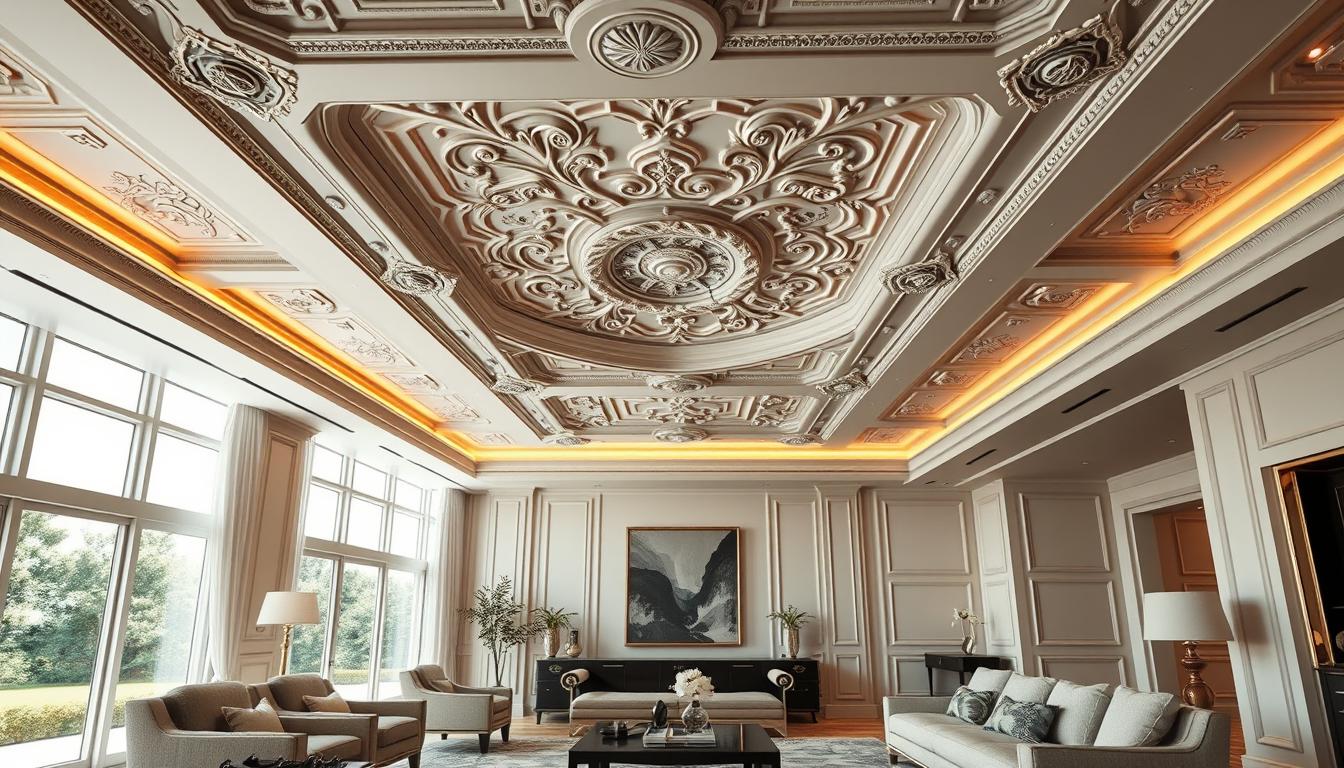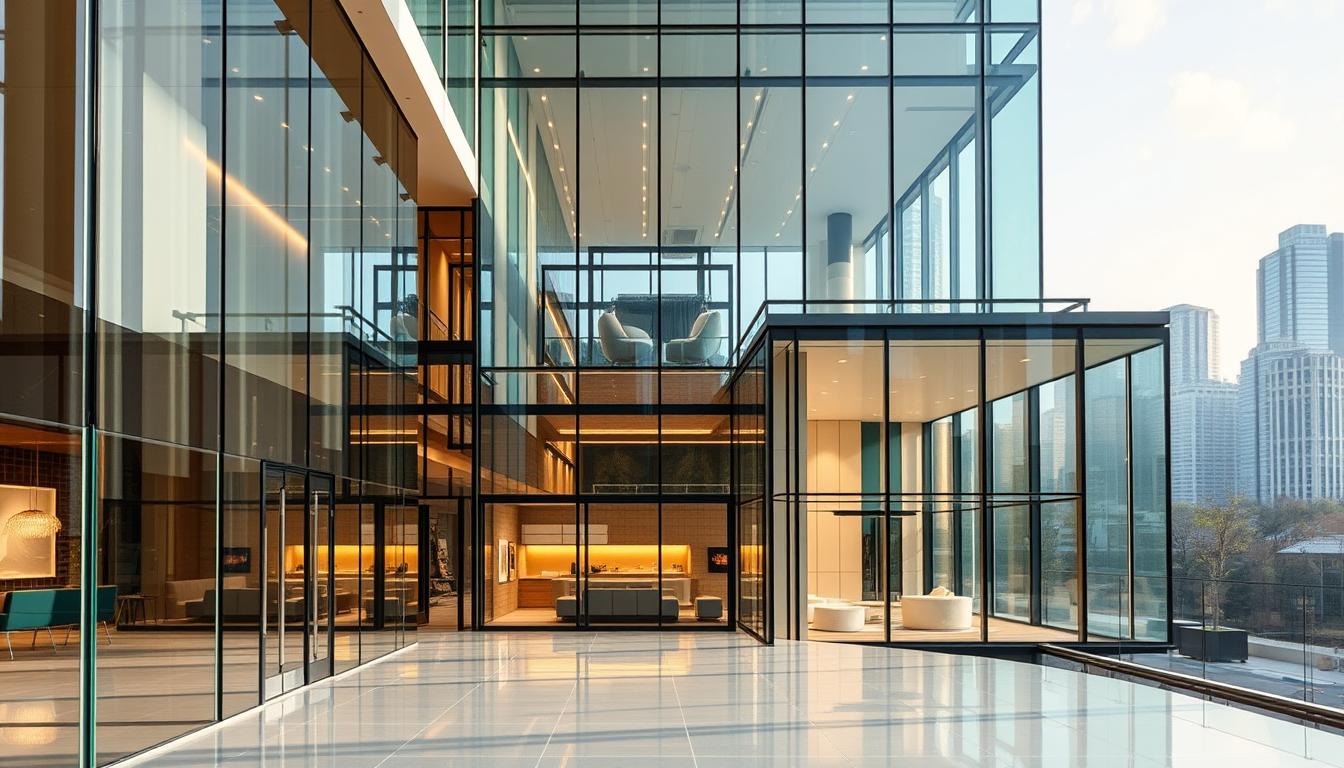Did you know Italian-inspired homes are very popular in the U.S.? Italian-style homes interior designs are loved for their elegance, warmth, and rich history. They are perfect for those wanting a sophisticated living space.
We’ll dive into what makes this style special. We’ll talk about color palettes, furniture, architectural details, and textiles. Whether you dream of a Tuscan-inspired villa or a Mediterranean-style home, our guide has everything you need.
Key Takeaways
- Understand the core elements of Italian-style interior design.
- Learn how to choose the right color palette and furniture.
- Discover the importance of architectural details and textiles.
- Get inspiration for creating a Tuscan or Mediterranean-style home.
- Explore practical tips for incorporating Italian design into your home.
What Defines Italian-Style Home Interiors?
Italian interior design mixes classic elements with a cozy feel. It creates a sophisticated yet welcoming living space. This blend is key to Italian-style home interiors.
Key Characteristics of Italian Design
Italian design uses natural materials like stone, wood, and terracotta. These add warmth and authenticity. Classical features, such as arches and columns, are also important.
The use of ornate decorative details like intricate carvings and gilded finishes adds elegance. These elements balance form and function beautifully.
Emphasis on Historical Influence
Italian interior design draws from the country’s rich history. Styles like Renaissance and Baroque are significant. These influences show in classical motifs, luxurious fabrics, and detailed furnishings.
By using elements from Italy’s past, homeowners connect with the country’s culture. This adds depth and character. It also honors the timeless beauty of Italian design.
Color Palettes That Capture Italian Elegance
The heart of Italian interior design is in its colors, inspired by the Mediterranean. Italian homes are known for their warm, inviting feel. This comes from the careful choice of colors throughout.
Warm, Earthy Tones
Warm, earthy tones are key in Italian design. Terracotta, sienna, and golden brown are used to make spaces cozy and welcoming. These colors remind us of the Italian countryside, bringing warmth and comfort to homes.
To bring these tones into your home, start with a color scheme of brown, beige, and terracotta. Use these for walls, floors, and furniture. This creates a space that feels inviting and cohesive.
Bold Accent Colors
Bold accent colors also play a big role in Italian design. These colors, inspired by the Mediterranean, add elegance and sophistication. Deep blues, rich greens, and vibrant yellows are great for adding depth and interest.
| Color | Inspiration | Usage |
|---|---|---|
| Terracotta | Italian countryside | Walls, flooring |
| Deep Blue | Mediterranean Sea | Accent furniture, decor |
| Golden Brown | Tuscan landscapes | Furniture, woodwork |
By mixing warm, earthy tones with bold colors, you can make a unique Italian-style interior. This reflects the beauty of the Mediterranean.
Furniture Selections for Authenticity
Italian-style homes are known for their elegant furniture. This furniture is key to capturing the rustic elegance of this style. The right pieces can make you feel like you’re in the Tuscan countryside or the Amalfi Coast.
Choosing furniture for an Italian-style home is all about the materials, craftsmanship, and design. Natural materials like solid wood, marble, and terracotta add depth and authenticity. These materials warm up your space and share stories of tradition and heritage.
Choosing the Right Materials
The material you choose is vital for an authentic Italian-style home. Solid wood is a favorite in Italian furniture making. It’s used for everything from rustic beams to detailed furniture pieces.
Marble and terracotta add elegance and earthiness, respectively. They bring a unique touch to your space.
- Solid wood for durability and character
- Marble for luxurious countertops and surfaces
- Terracotta for earthy, rustic charm
Iconic Italian Furniture Brands
Italy is famous for its furniture brands that showcase the country’s design. Brands like Minotti and Poltrona Frau are known for luxury and craftsmanship. They offer furniture that reflects the Italian style, from sleek sofas to elegant dining tables.
When picking furniture, it’s not just about the brand. It’s about the story behind the piece. Look for items that show the craftsmanship and detail Italian furniture is famous for. This way, you’ll create a space that’s not only beautiful but also true to its roots.
Flooring Options in Italian-Style Interiors
In Italian interior design, flooring is more than looks. It’s about creating a feel that’s full of old world charm. The right floor can make a room feel like it’s from the Tuscan countryside or Italy’s historic streets.
Two top picks for Italian design are terracotta tiles and rich wood flooring. They both bring a unique touch to your home.
Terracotta Tiles
Terracotta tiles are a big part of Italian architecture. They’re known for their warm, earthy look and rustic feel. These tiles add history and warmth to any room, making them perfect for Italian-style homes.
Here are some benefits of terracotta tiles:
- Durability: Terracotta tiles are very strong and can handle a lot of foot traffic.
- Aesthetic Versatility: They come in many colors and patterns, giving you lots of design options.
- Thermal Mass: Terracotta tiles help control indoor temperatures, keeping places cooler in summer and warmer in winter.
Rich Wood Flooring
Rich wood flooring is also popular in Italian homes. It adds elegance and sophistication to any room. Wood floors can be light or dark, making them versatile for design.
Here are some benefits of rich wood flooring:
- Elegance: Wood floors make a room feel luxurious and sophisticated.
- Durability: With the right care, wood floors can last for many years.
- Timeless Appeal: Wood floors never go out of style, making them a great investment for your home.
| Flooring Type | Characteristics | Benefits |
|---|---|---|
| Terracotta Tiles | Warm, earthy tones; rustic charm | Durable; aesthetically versatile; thermal mass |
| Rich Wood Flooring | Elegant; sophisticated; versatile | Luxurious; durable; timeless appeal |
When picking between terracotta tiles and rich wood flooring, think about the look you want for your Italian-style home. Both options have unique benefits that can really enhance the old world charm of your space.
Incorporating Architectural Details
Italian design is all about its architectural elements. These add character to any home. Italian villa styling is famous for its historical and beautiful features. They make any space feel more welcoming.
There are several important elements to think about when adding these details. Let’s start with arches and curves in Italian design.
Arches and Curves
Arches and curves are key in Italian architecture, inspired by ancient designs. They make spaces look interesting and feel elegant. You can use arches in doorways, windows, or even in flooring or ceilings.
Tips for Incorporating Arches and Curves:
- Use arches to create a grand entrance
- Incorporate curved lines in your furniture and decor
- Consider arched windows for a more authentic look
Exposed Beams and Vaulted Ceilings
Exposed beams and vaulted ceilings are also key in Italian villa styling. They add grandeur and drama to a room. These features can make ceilings seem higher and spaces more open. To get this look, expose wooden beams or use vaulted ceilings in important areas like the living room or dining area.
The secret to successfully adding these architectural details is to balance them with your decor. This ensures a harmonious and authentic Italian-style home.
The Role of Textiles and Fabrics
Textiles and fabrics are key in Italian interior design. They add warmth, texture, and elegance to any room. They’re not just for function but also shape the look and feel of a space. In Italian homes, the right textiles and fabrics make the interior beautiful and true to its roots.
Choosing luxurious draperies and upholstery is crucial in Italian design. Fabrics like silk, velvet, and linen create a sophisticated atmosphere. For example, silk draperies add luxury, while velvet upholstery brings grandeur to living areas.
Luxurious Draperies and Upholstery
Luxurious draperies and upholstery are vital for an authentic Italian interior. High-quality fabrics enhance the look and make furniture comfortable and durable. Popular fabrics include:
- Silk for its shiny finish and luxurious feel
- Velvet for its softness and elegant look
- Linen for its natural texture and versatility
When picking draperies, think about the room’s color and style. For upholstery, choose fabrics that look good and are practical, keeping furniture comfy and lasting.
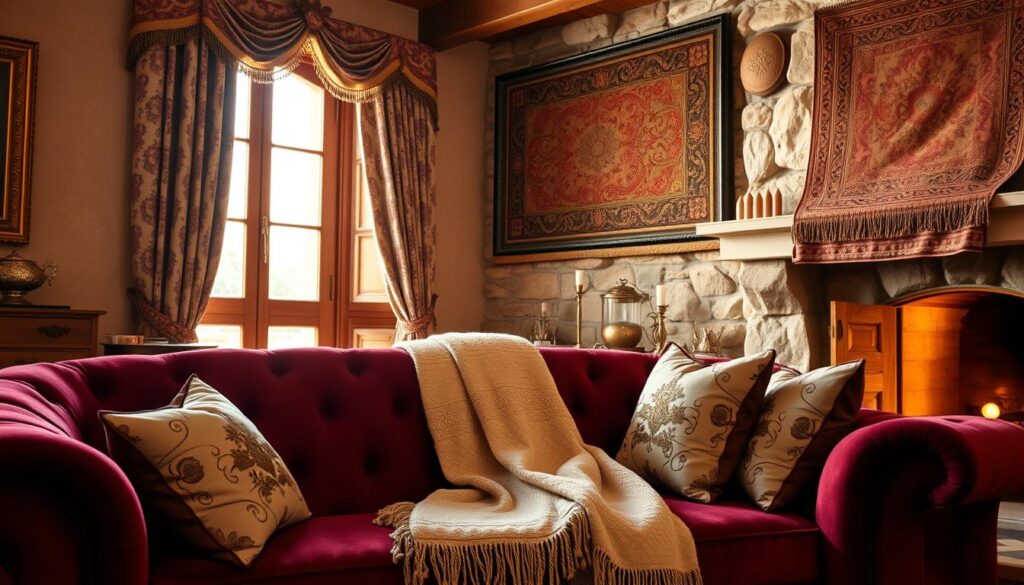
Traditional Patterns and Fabrics
Traditional patterns and fabrics are essential in Italian design. They bring authenticity and cultural heritage to homes. Classic patterns like florals, damasks, and intricate weaves are common in Italian interiors.
| Pattern/Fabric | Description | Use in Italian Interiors |
|---|---|---|
| Floral Patterns | Feature natural motifs and add elegance | Common in upholstery and draperies |
| Damask | A reversible fabric with intricate patterns | Used for upholstery and wall coverings |
| Intricate Weaves | Have complex patterns and textures | Used in decorative elements like throw pillows and blankets |
Interior design experts say, “The right textiles can change a room, making it more welcoming and sophisticated.” Traditional patterns and fabrics show Italy’s rich cultural heritage, adding charm to Italian homes.
“The essence of Italian design lies in its ability to blend traditional elements with modern sensibilities, creating spaces that are both timeless and contemporary.”
Lighting Solutions for Italian Homes
The right lighting can make an Italian-inspired home feel luxurious and welcoming. Lighting is key in Italian interior design. It can enhance the ambiance and highlight architectural details.
Chandeliers for Opulence
Chandeliers are a must in Italian homes, perfect for grand dining areas or entrance halls. They add opulence and become a room’s centerpiece. For an authentic Italian vibe, choose chandeliers from Murano glass or detailed metalwork.
These fixtures light up the room and showcase Italian craftsmanship. When picking a chandelier, think about the room’s size and ceiling height. A big chandelier works well in large rooms with high ceilings. A smaller one is better for cozy spaces.
Ambient Lighting Ideas
Ambient lighting is vital for a warm, welcoming Italian home. Use table lamps, floor lamps, and wall sconces for this. For a traditional Tuscan look, choose fixtures with a rustic or vintage feel, like terracotta or wrought iron.
Layering your lighting can also enhance the ambiance. Mix light sources at different levels for a visually appealing space. For example, pair a chandelier with table lamps or add LED strips under furniture. This adds depth and warmth to your home. For more retro decor ideas, check out our article on 70s home interiors.
Outdoor Spaces: Bringing the Italian Vibe Indoors
Italian-style homes are beautiful inside and out. Their outdoor spaces blend with nature perfectly. Outdoor areas are key to capturing the Mediterranean vibe.
Garden Design Inspirations
Garden design is vital in Italian outdoor spaces. These gardens are inspired by the Mediterranean. They have lush greenery, vibrant flowers, and rustic stone paths.
Think about adding olive trees, lavender, and rosemary. These plants are typical of Mediterranean landscapes. A well-designed garden can connect your indoor and outdoor spaces smoothly.
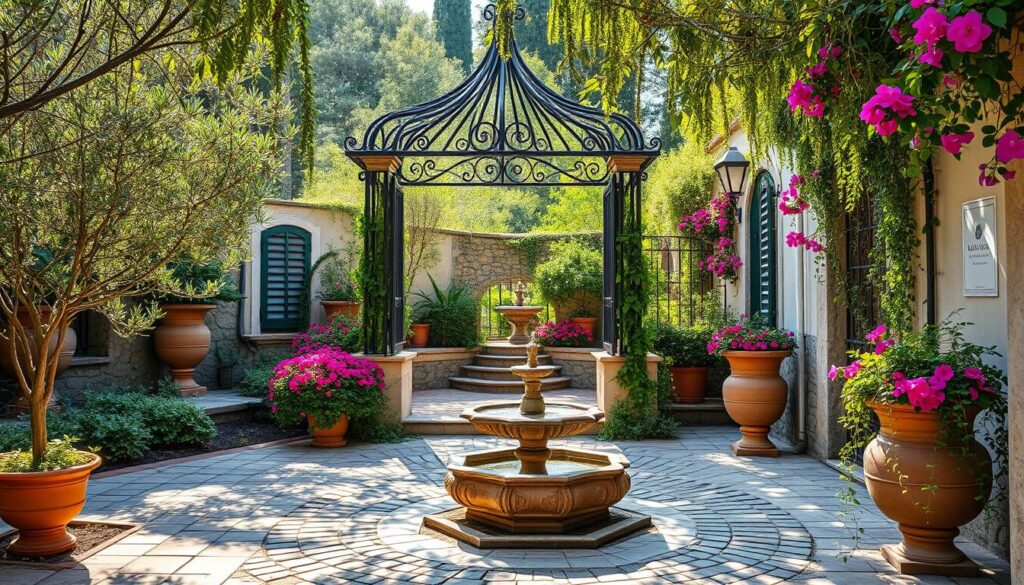
Outdoor Living Areas
Outdoor living areas are crucial in Italian homes. They offer a place to relax and enjoy the view. Use comfy furniture, warm lights, and Italian-style decor to make it inviting.
Italian outdoor areas often have pergolas and archways. These add beauty and depth. Adding outdoor kitchens and dining areas makes the space more functional.
| Design Element | Mediterranean Inspiration | Italian Style |
|---|---|---|
| Gardens | Lush greenery, vibrant flowers | Olive trees, lavender, rosemary |
| Outdoor Living Areas | Comfortable furniture, warm lighting | Pergolas, archways, outdoor kitchens |
| Pathways | Rustic stone, gravel | Cobblestone, brick pavers |
By using these design elements, you can create an outdoor space that’s both Italian and inviting. It’s perfect for relaxation and fun.
Final Touches: Accessorizing Italian Interiors
As we wrap up our guide to Italian-Style homes, accessorizing is key. It makes your space warm and inviting. Italian villa styling combines traditional beauty with personal touches, making a house feel like home.
Art and Decor That Speak Italian
To add authenticity to your Italian-style home, choose art and decor that shows Italy’s rich history and culture. Vintage pieces, classical sculptures, and traditional Italian artwork add sophistication and elegance. Selecting the right accessories can make your space refined and welcoming.
With these final touches, your Italian-style home will come alive. It will be filled with warmth and character, embodying the timeless beauty of this design.
